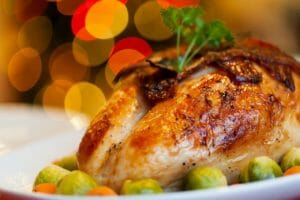The holidays signal a time for friends and family to come together and share many joyous meals. Between Thanksgiving and New
In addition to making sure you don’t gain too much weight before January first, it’s important to include food safety as a priority throughout the season. From preparation to cooking and cleaning, here are a few food safety reminders to help you have a healthy holiday season.
Food Handling Safety
- Big meals create the potential for lots of leftovers, but make sure you’re not leaving any food out for too long. Get leftovers into the refrigerator before they have been out for more than two hours. If any perishable food has been out for more than two hours, there is an increased risk of harmful bacteria to growing on or in the food, so it’s important that you throw it away.
- Keep hot foods at 140 degrees or higher and cold foods at 40 degrees or lower in order to prevent any harmful bacteria from forming.
- Wash all plates and cutting boards with soap and water, or put them in the dishwasher, especially if you have placed raw meat on any of them. It’s important to prevent cross-contamination throughout the food preparation process.
- Wash your hands thoroughly and often if you are helping in the kitchen.
- Wash all fresh produce, even if it states that it is pre-washed. It’s important to lower your risk of a produce-related illness by ensuring that all vegetables are washed properly.
- Keep unnecessary guests out of the kitchen, especially if they have been complaining about being sick.
- Always serve pasteurized juices, such as Apple Cider. Non-pasteurized versions can cause illnesses in someone who is physically vulnerable.
- Be extremely careful with eggs. Try to limit recipes that call for eating raw eggs and make sure eggs are cooked to 160 degrees.
Meat Safety
- If you plan on serving a turkey with any of your meals, make sure to defrost the turkey in the refrigerator and not on the kitchen counter.
- Always use a meat thermometer to ensure that you are cooking each piece of meat to the required safe temperature.
- Cook recipes that do not include meat first in order to prevent any cross-contamination with the raw meat. Ensure that those dishes are stored properly prior to consumption.
- During any food preparation, keep the raw meat away from anything else, and you can even ask your cashier at the grocery store to bag meats separately from the rest of your purchases to limit the risk of exposure to potentially harmful bacteria.
- Encouraging safe food preparation is important year-round, but with extra bodies, plates, and turkeys around this time of the year, it’s even more important to pay attention to the ways that we can keep our loved ones safe and healthy.
We hope you have a happy and healthy holiday season!
References:
Zelman, K. M. (n.d.). Top 10 Holiday Food Safety Tips. Retrieved from https://webmd.com/food-recipes/features/top-10-holiday-food-safety-tips#1
Public Affairs. (2015, October 05). Winter Holidays. Retrieved from https://foodsafety.gov/keep/events/Winter Holidays/index.html